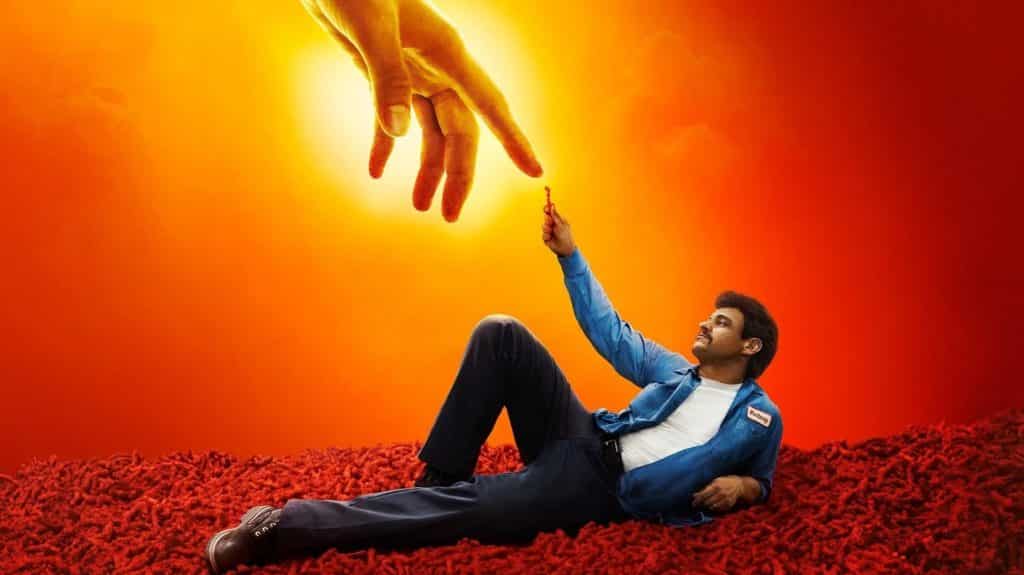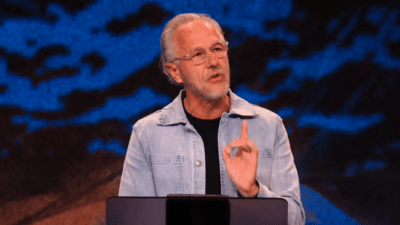A feel-good rags-to-riches biopic about a man known for his Christian faith premiered globally today via streaming services. But an investigation has largely debunked much of the story’s basis.
Flamin 'caliente, premiering today on Hulu and Disney Plus, depicts the life story of Richard Montañez, who over 40-plus years at Frito-Lay rose from a janitorial role to an executive leader with their Hispanic Business Unit. The inspirational drama from faith-film producer DeVon Franklin (The Star, Breakthrough) is billed as the origin story of Flamin’ Hot Cheetos, a tale that Montañez has recounted in business seminars and churches for the past 15 years.
However, a year-long Tiempos de Los Ángeles investigación published in 2021 revealed that key claims of Montañez are overstated. The report, based on a dozen interviews, found Montañez was not involved in the creation of the original Flamin’ Hot brand or blend of spices, which occurred at the Frito-Lay headquarters in Texas. Montañez worked at a Frito-Lay plant in southern California.
En el Times report, Frito-Lay called Montañez’s story an “urban legend.” A follow-up statement from parent company PepsiCo señalado the “incredible impact on our business” that Montañez has had but did not correct any details in the investigative story.
The producer of Flamin 'caliente, DeVon Franklin, also has ties to a West Coast megachurch at the center of recent controversy. Franklin serves on the board of directors at Churchome, known as a “megaiglesia de celebridades” for star congregants like Justin Bieber and Kourtney Kardashian.
Your tax-deductible gift helps our journalists report the truth and hold Christian leaders and organizations accountable. Give a gift of $30 or more to The Roys Report this month, and you will receive a copy of “Hurt and Healed by the Church” by Ryan George. To donate, haga clic aquí.
But the church is currently facing a class-action lawsuit for forcing employees to tithe. It also is under fire for knowingly rehiring an alleged rapist, who resigned shortly after El Informe Roys (TRR) made the news public.
Through a representative, Franklin declined to comment on the current scandals involving Churchome.
In a recent interview, Franklin defended the film’s accuracy, saying that he met with the “top brass at Frito-Lay” in Plano, Texas, prior to the investigative story. “We did our due diligence in understanding and listening to all of these different points of view, to make sure that the movie we made was accurate,” said Franklin.
The film, written by screenwriters Lewis Colick and Linda Yvette Chávez, features several key scenes from Montañez’s books which the Times story refuted. These include Montañez and his family formulating a blend of spices purported to be the Flamin’ Hot recipe, and a high-stakes business meeting with former PepsiCo CEO Roger Enrico who died in 2016.
Franklin, known for his popular faith-based films over the past two decades, conceded that Montañez “gets carried away” with his account of events. “He likes to have fun with how he tells the story,” dijo Franklin. The producer also stated that he screened the film for Frito-Lay executives and they found it “very balanced.”
Montañez, who is representado by All American Entertainment Speakers, remains a popular motivational speaker who receives $10,000 to $30,000 per speaking engagement. It is unclear if his church guest appearances—or engagements at the Willow Creek-backed Cumbre de Liderazgo Global—are for a similar fee.
In December 2021, Montañez habló during a Sunday service at Church on the Rock in St. Peters, Missouri, recounting in spiritual terms his story of creating Flamin’ Hot snacks to the congregation.
“God has something for you,” preached Montañez. “It’s already there. I created Hot Cheetos, but it was always there. That’s why I say, with God, all you need is one revelation (to) create a revolution.”
Montañez did not immediately respond to TRR’s request for comment. He granted CBS an interview in 2021 where he addressed some claims in the Times article. “If you want to go ahead and say it was a team effort, I’ll give you that,” he told CBS reporter Lee Cowan. “But, in my heart, it had nothing to do with a team.”
 Periodista independiente Josh Shepherd escribe sobre fe, cultura y políticas públicas para varios medios outlets. He and his family live in the Washington, D.C. area.
Periodista independiente Josh Shepherd escribe sobre fe, cultura y políticas públicas para varios medios outlets. He and his family live in the Washington, D.C. area.


















5 Respuestas
And we wonder why church services are down. How about we do a redo. Churches are local and small and the pastor is modestly paid and the message is about Jesus and his salvation plan. Nahhhhhh. Where’s the bucks in that.
““God has something for you,” preached Montañez. “It’s already there. I created Hot Cheetos, but it was always there. That’s why I say, with God, all you need is one revelation (to) create a revolution.” “. [From the JS article above].
It seems that we here have ‘origin mythology’ as the delivery vehicle for a transcendent belief in the nature of God and God-action.
The launching myth is then portrayed as being subject to claims as to inaccuracy.
The question arises as to whether the delivered message about God is effected (or not) by the claimed failings in the delivery vehicle. A concomitant being whether all myths (of origins or whatever) suffer, and inevitably so, from this same generic failing of empirical inaccuracy.
A fundamental question then arises, and this perhaps the perennial secular question, as to the extent to which the Bible itself subsists crucially in mythology which cannot pass the empirical test, and instead relies on faith in mythology to secure adherence.
So what Martinez says above about God, works for me; and what he says about Cheetos doesn’t at all register, because irrelevant. So where does that leave things: my sense being that most human beings share in the imperfections of Martinez; and I’m not going to write off what they have to say because of that failing. I’m not going to write off the Bible thesis because of its reliance on mythology open to empirical questioning.
“He likes to have fun with how he tells the story,”
In other words, fabrication is ok as long as it makes for a good story ????????
Tim. I like it that words often have multiple meanings or connotations. Fabrication is such a word.
It can mean lying or embellishing, as you suggest. It can mean the putting together of something with utility.
Story telling is a crucial part of being human. How you tell a story varies with audience. Stories tend to evolve across multiple tellings. I think we rely on audience to understand embellishment and evolving.
We also fabricate to facilitate. We fabricate enclosures into which we pour concrete; and what we end with is separate and distinct from the facilitating fabrication. We fabricate first and second stage vehicles to get payload into orbit.
Fabrication in story telling is excusable, as long as audience does not allow itself to be deceived, as long as what is delivered (final-form, payload, product, message) is not compromised by the fabrication.
I grew up in the Church of Scotland, where ministers routinely offered embellished homilies about actual human events, in order to voice a value or principle the Bible speaks to. That worked for me.
I have to admit. He appears to be the smartest guy in the room. He either did or did not invent the product. Yet getting a lot of money for inspirational talks on (unknown why to listen). If true, then Frito lay should take him to court under the legal precedence of “liar liar pants on fire”.